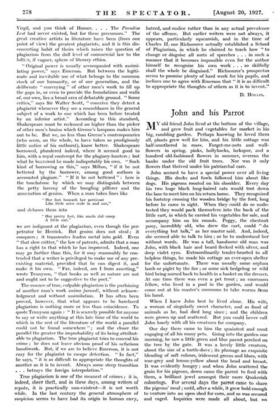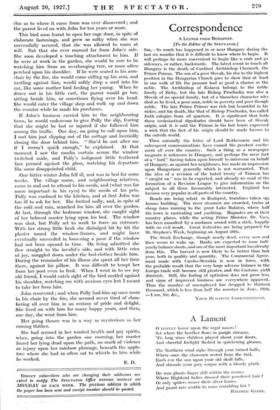John and his Parrot
MY old friend John lived at the bottom of the village, and grew fruit and vegetables for market in his big, rambling garden. Perhaps knowing he loved them all, plants grew well for him, and his little cottage was half-smothered in roses. Forget-me-nots and wall- flowers in spring, pinks, hollyhocks, larkspur, and a hundred old-fashioned flowers in summer, overran the banks under the old fruit trees. Nor was it only flowers that thrived under his patriarchal care. John seemed to have a special power over all living things. His ducks and fowls followed him about like dogs. His pigeons roosted on his shoulder. Every day his two huge black long-haired cats would trot down the lane to meet him on his return home. They recognized his footstep crossing the wooden bridge by the ford, long before he came in sight. When they could do so unde- tected they would pack themselves into the back of the little cart, in which he carried his vegetables for sale, and accompany him on his rounds. Peggy, the chestnut pony, incredibly old, who drew the cart, could " do everything but talk," as her master said. And, indeed, she seemed able to talk to him ; or he to understand her without words. He was a tall, handsome old man was John, with black hair and beard flecked with silver, and deep violet eyes. Extraordinarily tender-hearted to all helpless things, he made his cottage an ever-open shelter for the unfortunate. There was usually some orphan lamb or piglet by the fire ; or some sick hedgehog or wild bird being nursed back to health in a basket on the dresser. At one time there was even a pet trout ; an enormous fellow, who lived in a pool in the garden, and would come out at his master's summons to take worms from his hand.
When I knew John best he lived alone. His wife, a woman of singularly sweet character, and as fond of animals as he, had died long since ; and the children were grown up and scattered. But you could never call John lonely with all his creatures for company.
One day there came to him the quaintest and most engaging of all his many pets. Going into the garden one morning, he saw a little green and blue parrot perched on the tree by the gate. It was a lovely little creature, about the size of a turtle-dove ; its plumage an exquisite blending of soft colours, iridescent greens and blues, with rose-grey and lemon-yellow about the head and breast. It was evidently hungry ; and when John scattered the grain for his pigeons, down came the parrot to feed with them, a brilliant jewel amongst their more Quakerish colourings. For several days the parrot came to share the pigeons' meal ; until, after a while, it grew bold enough to venture into an open shed for corn, and so was secured and caged. Inquiries were made all about, but no clue as to where it came from was ever discovered ; and the parrot lived on with John for ten years or more.
This bird soon learnt to open her cage door, in spite of . elaborate fastenings, and grew so sulky when she was successfully secured, that she was allowed to roam at will. Not that she ever roamed far from John's side. She soon developed a touching attachment to him. If he were at work in the garden, she would be sure to be watching him from an overhanging tree, or more often perched upon his shoulder. If he were seated in his arm- chair by the fire, she would come sidling up his arm, and nestling against him, would softly drop a seed into his ear, like some mother bird feeding her young. When he drove out in his little cart, the parrot would go too, sitting beside him, or sometimes flying over his head. She would enter the village shop and walk up and down the counter while he made his purchases.
If Jolm's business carried him to the neighbouring town, he would endeavour to give Polly the slip, fearing that she might be lost or injured if she followed him among the traffic. One day, on going to call upon him, I met him just slipping out of the cottage and hurriedly closing the door behind him. " She'd be out after me if I weren't quick enough," he explained. At that moment I saw the muslin curtain across the window twitched aside, and Polly's indignant little feathered face pressed against the glass, watching his departure like some disappointed child.
One bitter winter John fell ill, and was in bed for some weeks. The village nurse, and neighbouring relatives, came in and out to attend to his needs, and (what was far more important in his eyes) to the needs of his pets. Polly was confined to the kitchen, and at first John was too ill to ask for her. She fretted sadly, and, in spite of the cold and rain, searched for him all over the garden. At last, through the bedroom window, she caught sight of her beloved master lying upon his bed. The window was shut, but Polly set to work to force an entrance. With her strong little beak she dislodged bit by bit the plaster round the window-frames, and might have eventually succeeded in loosening a pane if the window had not been opened in time. On being admitted she flew straight to the invalid's side, and with little cries of joy, snuggled down under the bed-clothes beside him. During the remainder of his illness she spent all her time there, against his pillow. It was difficult to tempt her from her post even to feed. When I went in to see my old friend, I would catch sight of the bird nestled against his shoulder, watching me with anxious eyes lest I. meant to take her from him.
- John recovered ; and when Polly had him up once more in his chair by the fire, she seemed never tired of clam- bering all over him in an ecstasy of pride and delight. She lived on with him for many happy years, and then, one day, she went from him.
Her going thence was in a way as mysterious as her coming thither.
She had seemed in her wonted health and gay spirits, when, going into the garden one morning, her master found her lying dead upon the path, no mark of violence or injury upon her rainbow plumage, beneath the apple- tree where she had so often sat to whistle to him while he worked.
E. D.



































 Previous page
Previous page